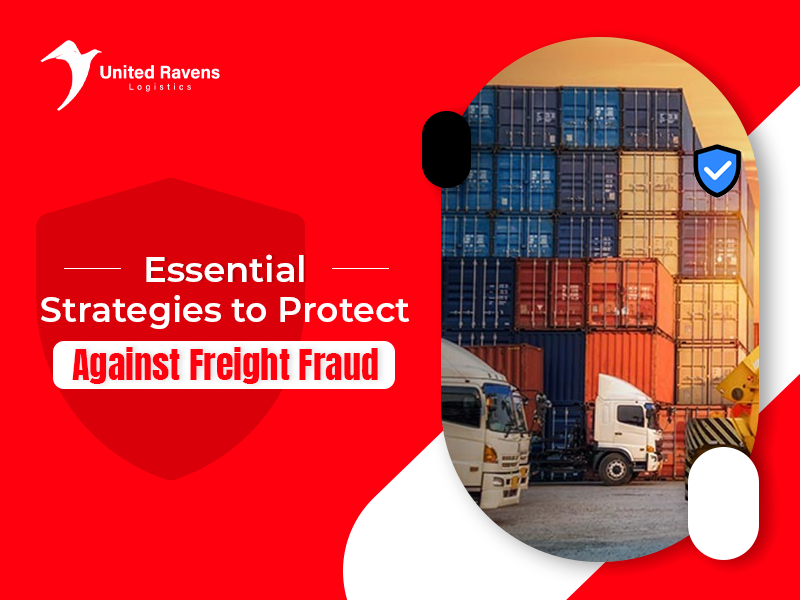The logistics industry is growing by 11.0% CAGR from year to year and is expected to reach around USD 109.31 billion in the year 2030. With the increase in logistics operations like transportation of cargo and maintenance of warehouses, the security of freight has become more critical than ever. Freight fraud takes advantage of freight with loose security and prevents the safe and timely delivery of goods.
In this blog, we will discuss essential strategies you should apply to protect yourself against freight fraud. But first, let us briefly go through freight fraud.
What is Freight Fraud?
Freight fraud is a malicious practice that targets freight brokers by exploiting vulnerabilities in their supply chain operations. Fraudsters employ various tactics to obtain stolen cargo and forge accompanying documents, making their illicit activities appear legitimate and challenging to detect. These criminals may acquire stolen goods through cargo theft, hijacking shipments, or infiltrating warehouses and distribution centers.
Different Types of Freight Fraud Attacks
Freight fraud can result in substantial financial losses, compromised security, and damaged reputations for logistics companies. Let us now see the different types of freight fraud that logistics companies and truckers can face.
- Cyber-attacks: Cyber-attacks in freight involve hacking into transportation management systems to disrupt cargo routing. Attackers may alter shipping details, reroute goods to unauthorized locations, or steal sensitive information that can be used for further fraudulent activities.
- Double Brokerage: This occurs when a freight broker, who has already been paid to arrange the cargo transportation, illegally re-brokers the same load to another carrier. The original freight broker may disappear with the payment, leaving the carrier who shipped the load unpaid.
- Missing Cargo: Missing cargo fraud involves cargo theft from the supply chain. This can happen at any point, from the warehouse to transit. The fraudsters might create false documentation to get possession of the load. This can lead to the loss of cargo for shippers and carriers.
- Enticing Rates: Fraudsters offer carriers attractively low rates to transport cargo. Once the job is completed, these fraudsters vanish without paying the carriers, often leaving them with significant financial losses and no recourse to recover the funds.
What Can Fraudsters Do to Harm Your Business Activities?
Scammers get hold of shipments through illegal activities. Once the stolen goods are in their possession, they create forged bills of lading, invoices, and other shipping documents to falsely represent themselves as legitimate shippers or carriers.
By presenting these forged documents, they can seamlessly introduce stolen goods into the supply chain, making it difficult for logistics companies to differentiate between authentic and fraudulent shipments.
Perpetrators may also engage in activities such as:
- Double-selling loads.
- Accepting payment from multiple parties for the same cargo.
- Engaging in fictitious pickups, claiming to have collected non-existent shipments, etc.
These deceptive practices can result in significant financial losses for logistics companies and disrupt the entire supply chain ecosystem.
How to Protect Your Freight from Fraud
Protecting against fraudulent freight activities is a paramount concern for any logistics company in the US. To protect yourself, you can implement stringent background checks, employ advanced tracking technologies, foster strong partnerships with law enforcement agencies, and regularly train personnel to identify and mitigate potential fraud risks. Let us now see them in detail:
- Proper Verification: Ensure that all documents related to the cargo, such as the identity number and load information, are thoroughly verified. This may include checking the authenticity of the paperwork and the credentials of the personnel handling the cargo.
Sometimes, ignoring a slight difference in the email can cost you thousands of dollars. So, carefully verify the email of carriers who call for load inquiries. Once you have finalized a carrier, try calling their official number to verify the identity of the driver who will be handling the load.
- Cargo Inspection and Routine Checkups: Make sure to conduct regular inspections during transit. You can ask the driver to provide you with their truck details, which you can instruct your team to verify during load pickup.
You can also set up checkpoints along the route for in-between-road inspections to detect any unusual activities or unauthorized changes in the shipment.
- Real-Time Tracking: Implement a system for the real-time tracking of cargo. This allows for constant monitoring of the shipment’s location and alerts you to any deviations from the planned route or schedule, which could indicate tampering or theft.
By employing these strategies, you can significantly reduce the risk of cargo theft and unauthorized access to shipments.
Conclusion
Since freight fraud allows fraudsters to make quick bucks easily, it is crucial to stay vigilant and protect yourself against freight fraud. So, before assigning any load to drivers, verify the identity of the driver using proper verification of documents. You also need to conduct inspections during transit and implement real-time tracking solutions. If fraudsters get hold of the shipment, they can double-sell the load, engage in fictitious pickups, and steal sensitive company information. So, stay vigilant and stay safe!!

